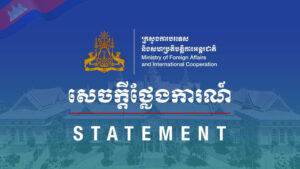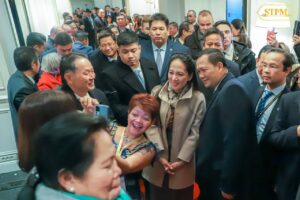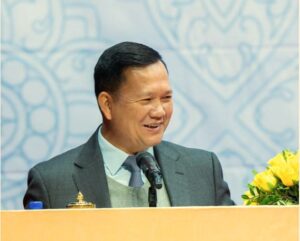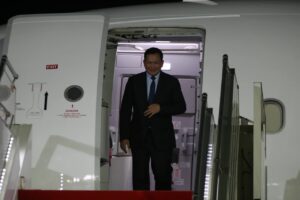(Video) Selected Comments of Samdech Thipadei Hun Manet, at the closing session of the Ministry of Civil Service’s annual conference to review the 2024 work results and to set objectives for 2025 [Unofficial Translations]
[1]
(1) Three activities on civil service – recruiting new officials, analyzing functions, and preparing an incentive system
Regarding this point (of promoting the implementation of measures in the education sector […] and of measures in the health sector), we have the following five key measures – public administration (which is placed as) the first priority; secondly education, thirdly health, fourthly strengthening the mechanism to resolve and maintain the safety of villages, communes/Sangkat, focusing on the fight against drugs, and fifthly, participating in strengthening of the justice system through extrajudicial (dispute) resolution […] In strengthening of the civil service/public administration sector, we have selected three major tasks/activities to work on – firstly, recruiting new officials; secondly, analyzing functions; and thirdly, preparing an incentive system […] in which, reforming and strengthening the education sector is being conducted from kindergarten to higher education and teachers training […] whereas in the health sector […] the committee focuses on strengthening the fundamental level of healthcare system, meaning the health centers […]
(2) NCPE to give weight and political message, to score results quicker, and to take up responsibility
Why is it necessary to create (the National Committee to Promote the Implementation of Measures – NCPE), while there are already annual plans. Three main objectives are – firstly, to give weight and political messages to these priority tasks, by focusing on (the approach of) strengthening rather than expanding […], secondly, to achieve results quickly […] while the three ministries continue to lead the works […] the committee will quickly increase its weight and support […] and thirdly, to take up responsibility. Some of the issues are sensitive and complex, especially this civil service reform, which the Prime Minister needs to be directly responsible for […] some would say how come the committee doesn’t do all of the work then? If they do all of the works, what will the ministry do? The committee does not work instead of the ministry. It helps in a short period of time to make these pillars/important fields strong and move forward quickly because it has weight, both political, financial, and some other necessary impetuses […]
(3) Integral recruitment system, institutional capacity improvement and fair incentive system
We use a holistic approach (in the reform efforts). In some places, it is inevitable to make surgical decisions to ensure sustainability and efficiency […] Is the reform a wish of the ministry or the minister? It is not so […] let us highlight the sensitive reforms in some key measures related to the reform of the civil service. On this (work), there seems to be a rumor that there is ambiguity and difficulty in understanding the analysis (of the function) […] Whether this work have the support of the Royal Government or is it just (the desire of) the minister? […] Before getting down to the reform issue, let’s take a look at the first measure among the five key measures of strengthening public administration. In fulfilling this mission, as is mentioned by (Deputy Prime Minister and Minister of Civil Service) HE Hun Many, we have three important tasks:
(From the prepared text)
1. Implementing a system for recruiting officials with integrity, transparency, fairness, inclusiveness, and efficiency;
2. Strengthening institutional capacity and achievement to improve work quality with discipline, ethics, professionalism, efficiency, and effectiveness; and
3. Implementing an incentive system to support achievement with consistency, equity, efficiency, and sustainability
[2]
(4) Relevant institutions to make staff recruitment exam accurate by providing every candidate equal opportunities
The first achievement (about the civil service recruitment system) […] I have been following this matter every time there was an exam (to recruit civil service staff) […] There were 42 exams so far involving eight ministries and institutions, with 120,000 candidates, and only 4,197 of whom were to be selected. This meant that about 110,000 candidates were not being selected (based on their exam works) without reproaches with the results […] Just imagine, a person who has no hope from external factors, no father who is a VIP, no money to bribe, and relies only on his own abilities, with which, at first, he had no hope, but (the strict and fair exam) gave him hope.
His hope has influenced others […] This concrete action (will cause) a (change) in the mindset […] Without the participation of parents, citizens, especially young people, and candidates themselves, there would be no increase in applications, nor would there be any participation in the exam with their own abilities […] Gradually, we will change our habits, change our mindset, with the support of the people, and reach accuracy at some point throughout the country […] I am asking every relevant institutions to strive to make it accurate (in staff recruitment exams) […] by providing every candidate equal opportunities […]
[3]
(5) The reform of the civil service is the reform of the entire Royal Government and sub-national administrations
(The implementation of the incentive system to support achievement) is based in large part on the second factor, which is the analysis and defining of functions […] As mentioned in the report of (Deputy Prime Minister and Minister of Civil Service) HE Hun Many […] there is a consideration of encouraging each ministry and institution to be independent […] The reform of the public service is the reform of the entire framework of the Royal Government and sub-national administrations, […] and regarding the organization of competitions in the education and health sectors […] I have given two principles to the Council of Ministers to review the medals awarding procedures […] by firstly, establishing a working group for the Council of Ministers to work with experts from relevant ministries and institutions to list (the number of) officials with 10 years of seniority at least or more, including contract officials […] and secondly, review the Circular No. 01 (issued in 2001) […] to what extent should the number/size be adjusted or how flexible is it to be so that the opportunity to award medals to officials is accurate […]
[4]
(6) Strengthening rather than expanding and putting the house in order
This work (of strengthening capacity and institutional achievement) requires an assessment […] to be aware of what we can do more so as to strengthen it in line with the current direction and task requirements. I have (considered) this work since the beginning of the mandate […] to ensure greater efficiency in serving the people […] where there are problems, we fix them, where there are good things, we strengthen them further […] Sometimes the structure of ministries and institutions that have been set up for 10 or 20 years, since there was no digital, no e-government, no AI … needs to be reformed, both the structure and the work system, work flow, adjustment and review of official management […] we adopt the approach of firstly strengthening rather than expanding, which is to review the organizational structure, so that it does not become bloated, it does not overlap, simplifying the roles and responsibilities, and in cases where it needs to be reorganized, making it better, and secondly, putting the house in order by reviewing and deploying officials so that they do not overlap the roles and responsibilities of ministries and institutions […]
(7) Cambodia’s civil service reform approach is “strengthening rather than expanding”
I have cited the experiences of some countries that are currently doing this (civil service reform) […] Cambodia’s method and approach is “strengthening rather than expanding” (at this moment). We do not shrink (through downsizing/delayering) to strengthen […] In the past year, however, we have prevented expansion in some sectors that are not necessary except for education, health and agriculture […] Strengthen what? We are strengthening institutional efficiency, increasing public service provision and professional work, with each ministry and institution having to analyze and adjust its functions. Some ministries have already fulfilled this task, such as the Ministry of Education (Youth and Sports), which has combined a number of departments together.
(8) No merging but streamlining tasks for stronger and effective collaboration
Some departments were without staff and do not function […] I am sure we don’t want to hear that there was a need to create more departments because there were officials who needed to be given incentives and there was currently no department for them. Don’t cut the legs to fit the shoes […] We need to strengthen what we have instead of expanding it […] Some people suggest that “we should merge the three ministries – agriculture, rural development, and water resources – together.” My reaction was “the Cambodian way is different (from others). We maintain and strengthen these three ministries the way they are. We streamline tasks so that they can collaborate more, be stronger, and be more effective.” We don’t take the “merge to strengthen” approach […]
(9) Reform to succeed for clear vision, high commitment, participation and sacrfice
For any reform to be successful, four factors are needed. Firstly, there must be a clear vision. Why are we reforming? And in this case, reforming to ensure greater long-term efficiency. Secondly, high commitment […] We take “strengthening rather than expanding” approach to preserve what we have, adjust as necessary, and use what we have more effectively. Thirdly, there must be everyone’s participation. That is why I am the chairman of the committee, because I will be responsible for this task […] and (fourthly) sacrifice […] (Remember that if) we do not reform an ineffective institution, it also means that we have sacrificed efficiency. It is not that (by not reforming means) we are not sacrificing […] If we deploy officers incorrectly, we are sacrificing the opportunities of officers with potential because they do not have enough work and opportunities to show their abilities on […]
(10) Medical capacity building must be done, but find a win-win method for DES
The Minister of Health, HE Chheang Ra and a few medical doctors came to me and said that DES (Diplômes d’études spécialisées de la discipline MÉDICALE) students are not very strong because we took two years out of the curriculum. There was a time that medical students had to study eight years (for general medical diploma) before pursuing physician specialties for DES. Now, they can go for the DES exam by studying only six years. Those who studied for two years less (than the previous eight years curriculum) are said to be insufficiently thorough in medical diagnostic examination. They suggested that we bring back the eight-year system. Capacity building must be done, definitely, but let us find a method that will have the least impact. Find a win-win solution. I am suggesting that […] we should arrange the lessons the two years – that are taken out and said to be causing lack of diagnostic examination skill – to include in the six years curriculum […] in one year, the students would have to have more classes […] but we save them time, and the students do not skip lessons, and the professional ability […]
(11) “Excess (of staff) but lack (competent ones)”
We had prohibited institutions from recruiting new officials during the reform phase (of the public service was) because there was a situation of what we say – “there is an excess (of staff) but a lack (competent ones), (there is a) lack (of competent ones) but (there is an) excess of staff”. We demand a pause (to the recruitment process) to examine this issue […] Whether it is a “lack” or an “excess,” they must be seen through functional analysis, defining roles and responsibilities, not based on the feelings of the department heads, but based on real scientific and collective discussion […] To ensure improvement of efficiency of the institution, the service to the people, and increasing opportunities for distributing officials to work equally, there is no other choice but to reform […]
(12) No merging and/or eliminating but dividing and simplifying department tasks
We must ask this question – what are we looking for? […] while reforming means sacrificing, not reforming also means sacrificing […] We must do the following things. Firstly, structure. We are not eliminating ministries or institutions or merging ministries and institutions, […] but we must organize the roles and responsibilities, coordinate them clearly, and increase the synergy of the ministries […] secondly, the division and simplification of tasks in departments or unnecessary places where people are left without jobs, by looking first at laboratories; and second, at schools under the ministry […] The other day, the Ministry of Education (Youth and Sports – MEYS) and the Ministry of Labor have agreed between them that MEYS will take charge of training academics level, and the Ministry of Labor has asked to lower down to vocational training, by organize courses, and conducting researches focusing on vocational training […]
(13) Human resources are determining factor
Reforms start from the reform leadership mechanism/engine. There must be a shortcut method, giving weight and practical response. This is one of the basic reasons why the Prime Minister personally leads the committee to solve this sensitive work for speed and effectiveness […] Human resources are the most sensitive point […] Increase the efficiency of using officials because people are the determining factor […] The deployment of officials must be considered in accordance with the requirements of the tasks and training, the capacity enhancement and/or adjustment of the internal structure as much as possible […] using the R5 approach – retain, retrain and retain, reassign, retrench and recruit […] Originally, there were only four of Rs, since recruitment was not added yet […] we need to use them to their full capacity first. Recruitment is the final stage of surgery […] We do not just wake up from sleep and tell relevant ministries to stop. We consider all aspects, based on the actual situation. We give justice to officials who have been performing their duties, with seniority, and are willing […]
(14) Strengthen the official census for more effective institutional management
I would strengthen the official census. We did it more than 10 years ago – like in 2010. I don’t remember. We haven’t done the official census again yet. Now, sometimes people are listed in this ministry, this institution, but actually working in another place. Please do the official census and set up a digital system clearly […] We need to look at the management. If we can’t manage the data, we can’t do anything […] Gradually, the provincial governors need to know how many thousands of officials there are in their provinces, where they are, where they are transferred […] Soon, in conjunction with the plan, every official transfer must use the E-ID system […] and in order to achieve ID system, we need to organize data management based on organizing the system and the census […] As for increasing the efficiency of officials distribution […] we don’t take a merging formula, but a measures to strengthen the more effective use and management for institution, so that officials have more opportunities to help the nation […]
(15) Public administration reform is the heart of the effectiveness of the government
Hopefully, in this legislative term, we can out 70% to 80% of our house in order, in principle, so to move the country forward better. At first, it is difficult. Running is tiring, and muscles ache occurs, but as we keep running, we can have better health, our heart moves much better, we run faster […] by taking care of skilled officials, improving their qualifications, giving them roles, if they have the qualifications, with greater responsibility […] Training unskilled officials on the spot to make them more effective […] Making adjustments within the institution or going to the sub-national level in the institution […] Thinking about ways to adjust (workforce) to save money, while recruiting new and selecting skilled people for work. Filling the correct people in and retaining them is the way forward. Public administration reform is the heart of the reform and effectiveness of our government […]./.






